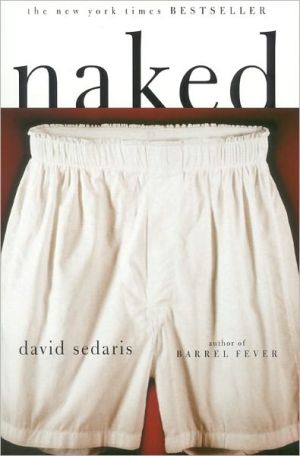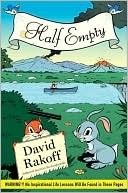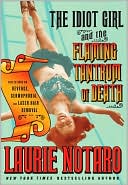Naked
In Naked, David Sedaris's message is pay attention to me. Whether he's taking to the road with a thieving quadriplegic, sorting out the fancy from the extra-fancy in a bleak fruit-packing factory, or celebrating Christmas in the company of a recently paroled prostitute, this collection of memoirs creates a wickedly incisive portrait of an all-too-familiar world. It takes Sedaris from his humiliating bout with obsessive behavior in 'A Plague of Tics' to the title story, in which he is finally...
Search in google:
Welcome to the hilarious, strange, elegiac, outrageous world of David Sedaris. In Naked, Sedaris turns the mania for memoir on its ear, mining the exceedingly rich terrain of his life, his family, and his unique worldview-a sensibility at once take-no-prisoners sharp and deeply charitable. A tart-tongued mother does dead-on imitations of her young son's nervous tics, to the great amusement of his teachers; a stint of Kerouackian wandering is undertaken (of course!) with a quadriplegic companion; a family gathers for a wedding in the face of imminent death. Through it all is Sedaris's unmistakable voice, without doubt one of the freshest in American writing.DetailsOne of the most talked-about, most enjoyed bestsellers of the year, Naked offers a collection of hilarious, touching, genre-bending vignettes. . .
Naked \ \ By David Sedaris Back Bay Books \ Copyright © 1998 David Sedaris\ All right reserved.\ ISBN: 9780316777735\ \ \ \ \ Chapter One\ \ \ chipped beef\ I'm thinking of asking the servants to wax my change before placing it in the Chinese tank I keep on my dresser. It's important to have clean money--not new, but well maintained. That's one of the tenets of my church. It's not mine personally, but the one I attend with my family: the Cathedral of the Sparkling Nature. It's that immense Gothic building with the towers and bells and statues of common people poised to leap from the spires. They offer tours and there's an open house the first Sunday of every October. You should come! Just don't bring your camera, because the flash tends to spook the horses, which is a terrible threat to me and my parents, seeing as the reverend insists that we occupy the first pew. He rang us up not long ago, tipsy--he's a tippler--saying that our faces brought him closer to God. And it's true, we're terribly good-looking people. They're using my mother's profile on the new monorail token, and as for my father and me, the people at NASA want to design a lunar module based on the shape of our skulls. Our cheekbones are aeronautic and the clefts of our chins can hold up to three dozen BBs at a time. When asked, most people say that my greatest asset is my skin, which glows--it really does! I have to tie a sock over myeyes in order to fall asleep at night. Others like my eyes or my perfect, gleaming teeth, my thick head of hair or my imposing stature, but if you want my opinion, I think my most outstanding feature is my ability to accept a compliment.\ Because we are so smart, my parents and I are able to see through people as if they were made of hard, clear plastic. We know what they look like naked and can see the desperate inner workings of their hearts, souls, and intestines. Someone might say, "How's it hangin', big guy," and I can smell his envy, his fumbling desire to win my good graces with a casual and inappropriate folksiness that turns my stomach with pity. How's it hanging, indeed. They know nothing about me and my way of life; and the world, you see, is filled with people like this.\ Take, for example, the reverend, with his trembling hands and waxy jacket of skin. He's no more complex than one of those five-piece wooden puzzles given to idiots and school-children. He wants us to sit in the front row so we won't be a distraction to the other parishioners, who are always turning in their pews, craning their necks to admire our physical and spiritual beauty. They're enchanted by our breeding and want to see firsthand how we're coping with our tragedy. Everywhere we go, my parents and I are the center of attention. "It's them! Look, there's the son! Touch him, grab for his tie, a lock of his hair, anything!"\ The reverend hoped that by delivering his sermon on horseback, he might regain a bit of attention for himself, but even with the lariat and his team of prancing Clydesdales, his plan has failed to work. At least with us seated in the front row, the congregation is finally facing forward, which is a step in the right direction. If it helps bring people closer to God, we'd be willing to perch on the pipe organ or lash ourselves to the original stainless-steel cross that hangs above the altar. We'd do just about anything because, despite our recent hardships, our first duty is to help others. The Inner City Picnic Fund, our Annual Headache Drive, the Polo Injury Wing at the local Memorial Hospital: we give unspeakable amounts to charity, but you'll never hear us talk about it. We give anonymously because the sackfuls of thank-you letters break our hearts with their clumsy handwriting and hopeless phonetic spelling. Word gets out that we're generous and good-looking, and before you know it our front gate will become a campsite for fashion editors and crippled children, who tend to ruin the grass with the pointy shanks of their crutches. No, we do what we can but with as little fanfare as possible. You won't find us waving from floats or marching alongside the Grand Pooh-bah, because that would only draw attention to ourselves. Oh, you see the hangers-on doing that sort of thing all the time, but it's cheap and foolish and one day they'll face the consequences of their folly. They're hungry for something they know nothing about, but we, we know all too well that the price of fame is the loss of privacy. Public displays of happiness only encourage the many kidnappers who prowl the leafy estates of our better neighborhoods.\ When my sisters were taken, my father crumpled the ransom note and tossed it into the eternal flame that burns beside the mummified Pilgrim we keep in the dining hall of our summer home in Olfactory. We don't negotiate with criminals, because it's not in our character. Every now and then we think about my sisters and hope they're doing well, but we don't dwell upon the matter, as that only allows the kidnappers to win. My sisters are gone for the time being but, who knows, maybe they'll return someday, perhaps when they're older and have families of their own. In the meantime, I am left as the only child and heir to my parents' substantial fortune. Is it lonely? Sometimes. I've still got my mother and father and, of course, the servants, several of whom are extraordinarily clever despite their crooked teeth and lack of breeding. Why, just the other day I was in the stable with Duncan when...\ "Oh, for God's sake," my mother said, tossing her wooden spoon into a cauldron of chipped-beef gravy. "Leave that goddamned cat alone before I claw you myself. It's bad enough you've got her tarted up like some two-dollar whore. Take that costume off her and turn her loose before she runs away just like the last one."\ Adjusting my glasses with my one free hand, I reminded her that the last cat had been hit by a car.\ "She did it on purpose," my mother said. "It was her only way out, and you drove her to it with your bullshit about eating prime rib with the Kennedys or whatever the hell it was you were yammering on about that day. Go on now, and let her loose. Then I want you to run out to the backyard and call your sisters out of that ditch. Find your father while you're at it. If he's not underneath his car, he's probably working on the septic tank. Tell them to get their asses to the table, or they'll be eating my goddamned fist for dinner."\ It wasn't that we were poor. According to my parents, we were far from it, just not far enough from it to meet my needs. I wanted a home with a moat rather than a fence. In order to get a decent night's sleep, I needed an airport named in our honor.\ "You're a snob," my mother would say. "That's your problem in a hard little nutshell. I grew up around people like you, and you know what? I couldn't stand them. Nobody could."\ No matter what we had--the house, the cars, the vacations--it was never enough. Somewhere along the line a terrible mistake had been made. The life I'd been offered was completely unacceptable, but I never gave up hope that my real family might arrive at any moment, pressing the doorbell with their white-gloved fingers. "Oh, Lord Chisselchin," they'd cry, tossing their top hats in celebration, "thank God we've finally found you."\ "It ain't going to happen," my mother said. "Believe me, if I was going to steal a baby, I would have taken one that didn't bust my ass every time I left my coat lying on the sofa. I don't know how it happened, but you're mine. If that's a big disappointment for you, just imagine what I must feel."\ While my mother grocery-shopped, I would often loiter near the front of the store. It was my hope that some wealthy couple would stuff me into the trunk of their car. They might torture me for an hour or two, but after learning that I was good with an iron, surely they would remove my shackles and embrace me as one of their own.\ "Any takers?" my mother would ask, wheeling her loaded grocery cart out into the parking lot.\ "Don't you know any childless couples?" I'd ask. "Someone with a pool or a private jet?"\ "If I did, you'd be the first one to know."\ My displeasure intensified with the appearance of each new sister.\ "You have how many children in your family?" the teachers would ask. "I'm guessing you must be Catholic, am I right?"\ It seemed that every Christmas my mother was pregnant. The toilet was constantly filled with dirty diapers, and toddlers were forever padding into my bedroom, disturbing my seashell and wine-bottle collections.\ I had no notion of the exact mechanics, but from overhearing the neighbors, I understood that our large family had something to do with my mother's lack of control. It was her fault that we couldn't afford a summerhouse with bay windows and a cliffside tennis court. Rather than improve her social standing, she chose to spit out children, each one filthier than the last.\ It wasn't until she announced her sixth pregnancy that I grasped the complexity of the situation. I caught her in the bedroom, crying in the middle of the afternoon.\ "Are you sad because you haven't vacuumed the basement yet?" I asked. "I can do that for you if you want."\ "I know you can," she said. "And I appreciate your offer. No, I'm sad because, shit, because I'm going to have a baby, but this is the last one, I swear. After this one I'll have the doctor tie my tubes and solder the knot just to make sure it'll never happen again."\ I had no idea what she was talking about--a tube, a knot, a soldering gun--but I nodded my head as if she and I had just come to some sort of a private agreement that would later be finalized by a team of lawyers.\ "I can do this one more time but I'm going to need your help." She was still crying in a desperate, sloppy kind of way, but it didn't embarrass me or make me afraid. Watching her slender hands positioned like a curtain over her face, I understood that she needed more than just a volunteer maid. And, oh, I would be that person. A listener, a financial advisor, even a friend: I swore to be all those things and more in exchange for twenty dollars and a written guarantee that I would always have my own private bedroom. That's how devoted I was. And knowing what a good deal she was getting, my mother dried her face and went off in search of her pocketbook.\ \ Continues...\ \ \ \ Excerpted from Naked by David Sedaris Copyright © 1998 by David Sedaris. Excerpted by permission.\ All rights reserved. No part of this excerpt may be reproduced or reprinted without permission in writing from the publisher.\ Excerpts are provided by Dial-A-Book Inc. solely for the personal use of visitors to this web site. \ \
Chipped Beef1A Plague of Tics7Get Your Ya-Ya's Out23Next of Kin40Cyclops46The Women's Open53True Detective61Dix Hill73I Like Guys81The Drama Bug95Dinah, the Christmas Whore106Planet of the Apes121The Incomplete Quad143C.O.G.153Something for Everyone202Ashes234Naked251
\ Dwight GarnerDavid Sedaris has an unmistakable voice -- high, reedy and more than a little bit mischievous, it leaps out at you on National Public Radio's "Morning Edition," where he is a semi-regular commentator. (He's the only soul who doesn't seem to be drowning in a Sargasso Sea of Sincerity.) Unlike most of NPR's on-air personalities, Sedaris' voice translates to paper. His first book, Barrel Fever (1993), was a memorably prickly collection of autobiographical comic essays. The book's best piece, "The SantaLand Diaries," detailed Sedaris' experiences as a disgruntled elf in a Macy's Christmas tableau -- it's become a minor classic of holiday fear and loathing.\ Sedaris' second collection, Naked, contains a similar amount of odd, confessional whimsy. Many of the pieces here are based on Sedaris' memories of his suburban childhood in North Carolina, and they combine an almost David Lynchian strangeness with the plucky wit of Evelyn Waugh. In "Next of Kin," he writes about how, after he finds a cheesy porn novel in the woods, his entire family winds up devouring it. ("A veil had been lifted, especially for Gretchen, who now saw the world as a steaming pit of unbridled sexuality.") In "A Plague of Tics," Sedaris describes how his multiple childhood compulsions made it almost impossible for him to get out of the house. ("After kissing the fourth, eighth, and twelfth carpeted stair, I wiped the cat hair off my lips and proceeded to the kitchen, where I was commanded to stroke the burners of the stove, press my nose against the refrigerator door, and arrange the percolator, toaster, and blender into a straight row.") Other essays here offer even more absurd comedy: A piece called "Dinah, the Christmas Whore" recounts the time Sedaris' sister brought a prostitute home for the holidays. The title story is about his experiences at a low-budget nudist colony.\ While none of the pieces here is as devilishly cranky as "The SantaLand Diaries," Naked is ultimately a stronger and more grounded book than Barrel Fever. That's because Sedaris digs deeper into his subjects here, and some of the best essays combine shrewd observation with some genuinely affecting subject matter. In a fairly miraculous piece called "The Women's Open," Sedaris writes about his sister's first period, which occurs on a public golf course. (Their befuddled, hapless father sends the poor girl off for "help" with the first woman he sees.) And an essay titled "Get Your Ya-Ya's Out!" contains some bracing writing about visiting his grandmother at her final nursing home: "Unlike her former home, Mayview made no attempt to disguise the inevitable. There was no talk of one's well-deserved golden years, no rented buses or craft carnivals."\ Sedaris is already a noted playwright -- he and his sister Amy write comedies under the name The Talent Family -- and word is he's at work on a novel. I'll be among those in line to buy it. -- Salon\ \ \ \ \ \ Francine ProseHilariously entertaining. . . .The essays in Naked re-create the cathartic, the spiritual experience of laughing so hard that it hurts. — New York Observer\ \ \ DetailsOne of the most talked-about, most enjoyed bestsellers of the year, Naked offers a collection of hilarious, touching, genre-bending vignettes. . .\ \ \ \ \ Library JournalThis collection of biographical stories from playwright and National Public Radio commentator Sedaris are at times heartwarming, poignant, sad, and laugh-out-loud funny. They cover Sedaris's dealing with obsessive-compulsive disorder, the realization that he is gay, his father's overprotective tendencies, his mother's and sister's love for detective shows, how he comes to believe he is like Richard Kimball's Fugitive, and how he and his siblings cope with the realization that their mother is dying of cancer. Read by Sedaris with assistance from his sister Amy, this humorous look at life will make listeners feel as if they are in the closet with David, trying to trap the person who stole money from his father or on the mountaintop where one of his sisters gets married. A wonderful addition to popular collections.Danna C. Bell-Russel, American Univ. Natl. Equal Justice Lib., Washington, D.C.\ \ \ \ \ PeopleBrilliant. . .a fresh comic voice. . .There's wisdom in these stories.\ \ \ \ \ DetailsOne of the most talked-about, most enjoyed bestsellers of the year, Naked offers a collection of hilarious, touching, genre-bending vignettes. . .\ \ \ \ \ R. L. PelaIf satire were a more revered literary tradition, David Sedaris would be considered an American master, and we might at last lay to rest all those overused references to James Thurber and Nathaniel West...\ Sedaris's second collection of stories is a hilarious heap of autobiography that recounts a gay childhood governed by a crabby, whiskey-soaked mother, followed by an adult life plagued by trailer trash and born-again wackos...All these murky memories and high-concept stories are culled from Sedaris's own odd life. But his curmudgeonly comic genius and outrageous wit make them our own as well, a wacked-out set of scenes from our all-too-familiar world.\ — The Advocate\ \ \ \ \ \ Kirkus ReviewsIn this collection of essays, playwright and NPR commentator Sedaris tops his anarchically hilarious miscellany Barrel Fever by inventing a new genre: autobiography as fun-house mirror. From the first sentence ('I'm thinking of asking the servants to wax my change before placing it in the Chinese tank I keep on my dresser'), Naked pretty well clobbers the reader into dizzy submission. Growing up in Raleigh, N.C., Sedaris had disruptive nervous tics that only disappeared once he took up smoking, which, 'despite its health risks, is much more socially acceptable than crying out in tiny voices.' The author volunteered at a mental hospital and spoke solely in Shakespearean English for a spell. One Christmas his sister brought home a co-worker who moonlighted as a prostitute: 'From this moment on, the phrase `ho, ho, ho' would take on a whole different meaning.' Sedaris's best humor is generally rooted in misery: At college he befriended 'a fun girl with a degenerative nerve disease' and confined to a wheelchair, with whom he successfully shoplifted (no one stopped them) and hitchhiked (everyone stopped for them); he astutely illuminates the weird mixture of altruism and vanity that motivated him to become his friend's caretaker. Sedaris's extensive résumé of hitchhiking trips and dire jobs has provided him with an absurd array of distressing incidental characters, like the belligerent, legless Jesus freak for whom he worked making jade clocks in the shape of Oregon. The author's wisecracking mother emerges as a full-blown comic heroine, and the essay discussing the months before her death achieves a brilliant synthesis of solemnity and humor. Only atthe end, when describing a visit to a downscale nudist camp, does Sedaris disappoint, as he seems to have gone on the jaunt solely to acquire filler material. Sedaris applies the same deadpan fastidiousness to his life that Charlie Chaplin applied to his shoe in The Gold Rush—this is splendid stuff.\ \







